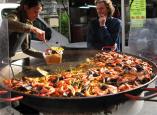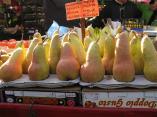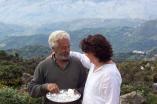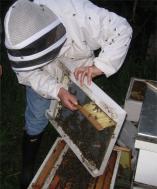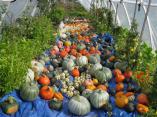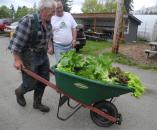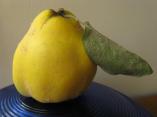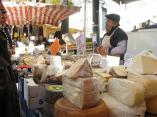How things change. A few years ago – 2006? – celebrity chef Anthony Bourdain visited Victoria to promote his latest book, which I believe was A Cook’s Tour. A strong showing of kitchen folk swelled the audience and there was a lively question and answer during which Bourdain talked about local food (nah, he said, I’m a chef: I seek the best ingredients no matter where they come from), most amazing food experience (attending a pig slaughter, coincidentally an episode recounted in his latest book) and worst food experience (a vegan feast in California). Not surprising from a meat-evangelist; he was very much in the thick of the nose-to-tail eating trend of those years, and vegans are an easy target. In his bestselling Kitchen Confidential he’d already opined that
“Vegetarians, and their Hezbollah-like splinter-faction, the vegans, are a persistent irritant to any chef worth a damn.
To me, life without veal stock, pork fat, sausage, organ meat, demi-glace, or even stinky cheese is a life not worth living.
Vegetarians are the enemy of everything good and decent in the human spirit, an affront to all I stand for, the pure enjoyment of food. The body, these waterheads imagine, is a temple that should not be polluted by animal protein. It’s healthier, they insist, though every vegetarian waiter I’ve worked with is brought down by any rumor of a cold.
Oh, I’ll accommodate them, I’ll rummage around for something to feed them, for a ‘vegetarian plate’, if called on to do so. Fourteen dollars for a few slices of grilled eggplant and zucchini suits my food cost fine.”
Last night I attended a screening of Forks Over Knives which leans heavily on a very different sort of book, The China Study, and maintains that plant-based diets will prevent and possibly even reverse the diet-related illnesses of our time: cancer, diabetes, heart and arterial disease. It was entertaining and informative enough, although there was a puzzling lack of comment about its assertions that added oils (including vegetable oils) are toxic, and a complete absence of discussion about the role that exercise plays in disease prevention and control, even though all the patients featured in the film were exercising like mad.
But this kind of advice has been around, and largely ignored, for years. In 2007 the buzz in Britain was that cured meats (and sedentary lifestyles) were the demons. Stay away from bacon, they said, even there in the land of the bacon butty. Not to mention the Full English Breakfast (and all its Scottish, Welsh and Irish counterparts).
It’s something that Marion Nestle, Michael Pollen and Mark Bittman have also been writing about for a while. Nestle has, like the film, pointed out the excessive influence of the meat and dairy industries on American food policies – and in particular the dietary recommendations represented most recently by the USDA’s MyPlate, which doggedly continues to include meat and dairy. So does Canada’s Food Guide, although it is careful to give alternatives equal weight.
It’s worth reminding ourselves how little protein we actually need vs how much we consume if we’re eating meat and dairy. To calculate what you need, multiply body weight in kilograms by .8, or weight in pounds by .37 to get the number of grams. For a 150 lb person, that amounts to 55g (a bit less than 2 ounces) per day: the entire daily protein needs could be met by 2 hamburger patties. But almost everything we eat has some protein in it, so if we’re eating a balanced diet with enough calories, we can clock up a healthy amount of protein without trying too hard.
So there’s no question we can get all the protein we need from plant-based diets, a point the American Dietetics Association made in its 2009 recommendation that vegetarian – and vegan – diets are safe for babies, children and adults, and recommended as a way to prevent chronic illnesses of the sort the film discusses.
Though I’ve reduced my meat consumption hugely in recent years, the sticking points for me would be cheese, yogurt, eggs and butter. And milk in my tea. And the fact that eating away from home becomes such a headache: so many restaurants, caterers and the like simply don’t make nice food without meat in it. In less cosmopolitan towns and cities, the vegetarian options on menus are too often ineptly executed stir-fries. Ah well. Not to worry about just now: lots of nice vegetables and fruits in my fridge this fine summer day. And soon, they promise, Green Cuisine will re-open.
